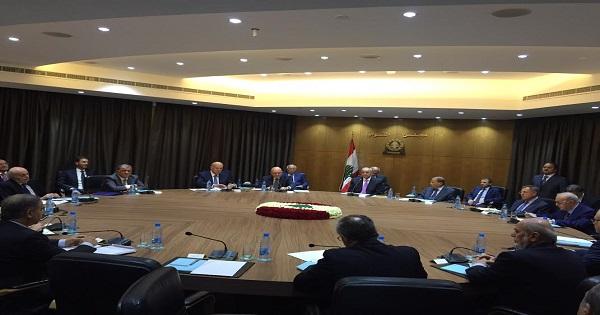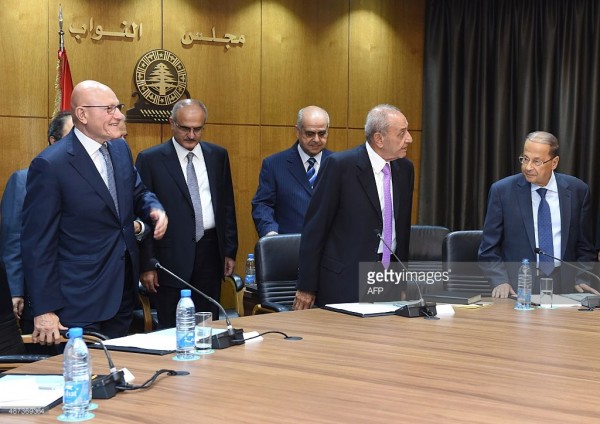
Speaker Nabih Berri, who chaired the National Dialogue, pleaded with rival political leaders to reach agreement to resolve the political crisis.
In a speech opening the first dialogue session at the Parliament building on Nijmeh Square, Berri voiced hope that the all-party talks would reach a road map to end Lebanon’s multi-faceted crises based on topics he outlined for the dialogue agenda.
“We meet to try to draw up fair and correct solutions. This matter needs the unification of stances, rather than a dialogue of the deaf,” Berri said. “I appeal to you, even the nation is appealing to you, to reach agreement hoping it is not too late to be able to draw a road map to pass the presidential election and launch legislation to draft the main laws aimed at shaping Lebanon’s future picture, bringing the executive authority out of disintegration and reactivating its roles.”
“What is required is to make a unified Lebanon in its territory, the people and institutions as an Arab model to pull sisterly countries out of disintegration and partition plans,” he added.
Berri stressed that dialogue is the only way to overcome crises facing Lebanon, along with “our commitment to the unity of our country and the national coexistence formula.”
Prime Minister Tammam Salam expressed hope that the dialogue would be good for the people and the future of the country.
“We expect the political parties to effectively and positively contribute toward the success of this dialogue in order to overcome this crisis,” Salam told reporters before entering the Parliament building to attend the all-party talks.

The three-hour meeting was held against the backdrop of preparations for a massive demonstration staged by civil society groups, backed by labor unions, in Martyrs’ Square in Downtown Beirut to protest the dialogue session. A new dialogue session was set for Sept. 16.
The Army and Internal Security Forces imposed tight security measures on roads leading to Nijmeh Square, keeping the area off limits to the protesters who tossed eggs at speeding convoys of leaders participating in the dialogue in a show of anger over the political class.
Telecommunications Minister Boutros Harb , one of the 16 politicians and heads of parliamentary blocs who attended the dialogue, described the talks as “good” despite his spat withMP Michel Aoun, head of the Free Patriotic Movement. “We stressed that holding the presidential election is the key to a solution to all problems included in the agenda.”
The session was ended by Speaker Berri after Aoun lost his temper when he spoke about what he called “lost legitimacy”of Parliament as a result of the extension of its mandate twice and the legislature’s “lost legality” as a result of the alleged violation of laws.
Also, Aoun’s calls for the election of a strong president representing the Christians drew quick responses from former Prime Minister Fouad Siniora, head of the parliamentary Future bloc, and Harb.
Addressing Aoun at the dialogue table, Siniora said: “We are not convinced of the election of a strong president representing the Christians because the president must represent all the Lebanese.”

Explaining his spat with Aoun, Harb said the FPM leader lost his temper when the I pointed out a contradiction in Aoun’s remarks that Parliament was illegitimate and had no right to elect a president, while at the same time proposing that Parliament must amend the Constitution to allow for the election of a president by a popular vote and approve an electoral law. “When I asked how can these two matters be reconciled, he [Aoun] became irate.”
Aoun hit back at Harb, saying that after he talked during the dialogue session about Parliament’s legitimacy, which has been “lost by the extension of its mandate and its legality, which it loses with the violation of laws,” Harb tried to divert the issue by saying Aoun’s remarks were motivated by his being a presidential candidate.
“Gen. Aoun responded to Harb saying: ‘I have spoken in terms of the law. Answer me in law, rather than with personal [hints] and intentions,’” according to a statement released by Aoun’s media office.
The first topic on the dialogue agenda was how to end the 15-month presidential vacuum.
MP Mohammad Raad, head of Hezbollah’s parliamentary bloc, reiterated his party’s support for Aoun’s presidential bid. “There is an agreement to elect Gen. Michel Aoun as president. We will not accept any president who does not provide a guarantee for the resistance,” Raad said during the dialogue session.
The National Dialogue session was boycotted by Lebanese Forces chief Samir Geagea, who has dismissed the talks as “a waste of time.” After the session ended Geagea was quoted as saying from Doha Qatar where he is on an official visit :
“The dialogue will solve nothing, it will only attract attention away from electing a president. The problem lies in the statelets inside the state, a possible reference to the Iranian backed Hezbollah militant group.
According to Al Jamhouriah newspaper the only participant that refrained from talking during the session was PSP leader MP Walid Jumblatt who sat and listened .

Leave a Reply
You must be logged in to post a comment.